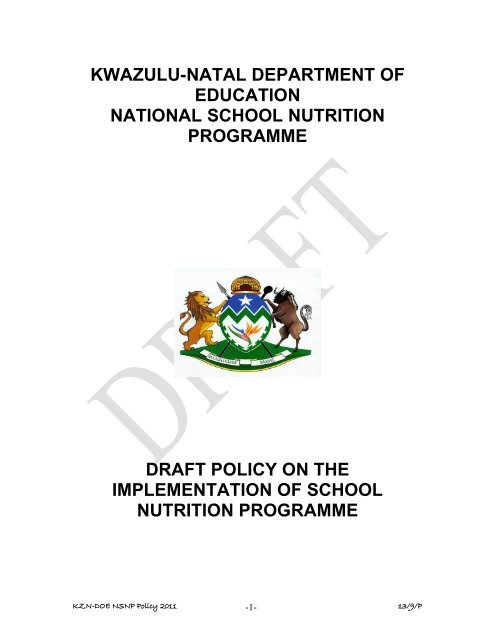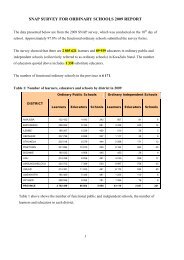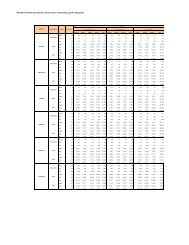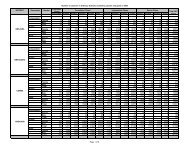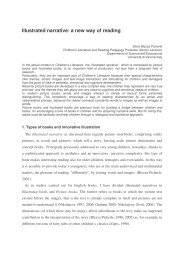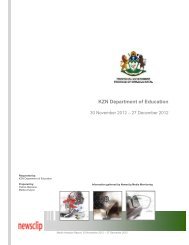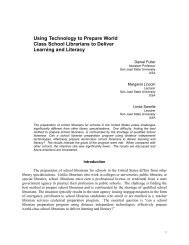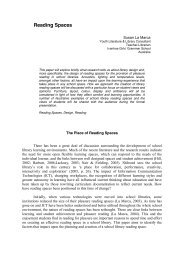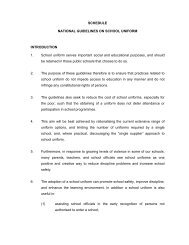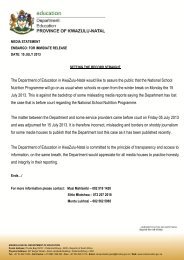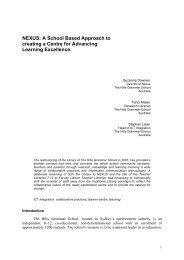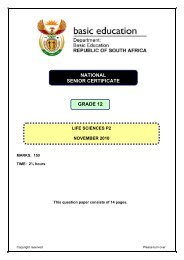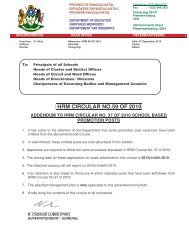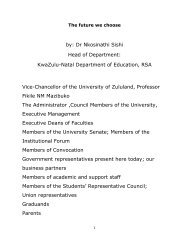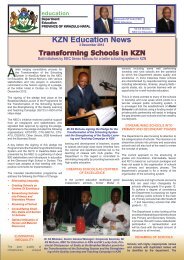National School Nutrition Programme - KwaZulu-Natal Department ...
National School Nutrition Programme - KwaZulu-Natal Department ...
National School Nutrition Programme - KwaZulu-Natal Department ...
You also want an ePaper? Increase the reach of your titles
YUMPU automatically turns print PDFs into web optimized ePapers that Google loves.
KWAZULU-NATAL DEPARTMENT OF<br />
EDUCATION<br />
NATIONAL SCHOOL NUTRITION<br />
PROGRAMME<br />
DRAFT POLICY ON THE<br />
IMPLEMENTATION OF SCHOOL<br />
NUTRITION PROGRAMME<br />
KZN-DOE NSNP Policy 2011 -1-<br />
13/9/P
TABLE OF CONTENTS<br />
1. GLOSSARY OF TERMS……………………………………………………………………………………………………………….3<br />
2. BACKGROUND………………………………………………………………………………………………………………………………..4<br />
3. PURPOSE ………………………………………………………………………………………………………………..………..…….5<br />
4. SCOPE OF APPLICABILITY………………………………………………………………………………………..…….6<br />
5. LEGISLATIVE MANDATES………………………………………………………………………………………..………….6<br />
6. TARGETING…………………………………………………………………………………………………………………….….……….8<br />
7. ROLES AND RESPONSIBILITIES…………………………………………………………………………..………….8<br />
7.1 <strong>School</strong> Principal ……………………………………………………………………………………………..…………….8<br />
7.2 <strong>School</strong> Governing Bodies (SGB) …………………………………………………………..…………..9<br />
7.3 Deputy Principal/HOD/NSNP Educator(s) ..…………………………………..………….9<br />
7.4 <strong>Nutrition</strong> Commitees ……………………………………………………………………………………..………………9<br />
7.5 District Office ………………………………………………………………………………………………..……………10<br />
7.6 Head Office …………………………………………………………………………………………………..……………………10<br />
8. PARTICIPATION OF SCHOOLS IN NSNP …………………………………………………..…………….11<br />
9. FEEDING ………………………………………………………………………………………………………………………..……………11<br />
10. JOB CREATION PROJECT ……………………………………………………………………………………..…………12<br />
11. FOOD HANDLERS APPOINTMENT …………………………………………………………………………..…….13<br />
12. SELECTION OF SERVICE PROVIDERS: SMME’S …………………………………..………..13<br />
13. LOCAL COOPERATIVES (LC'S)…………………………………………………………………….……….…..15<br />
14. TERMINATION OF SERVICE …………………………………………………………………………………..…..16<br />
14.1 SMME's …………………………………………………………………………………………………………………..………. 16<br />
14.2 LC's …………………………………………………………………………………………………………………………..…….… 17<br />
15. DISPUTES/CONFLICT RESOLUTION…………………………………………………………………….….….17<br />
16. DECENTRALIZATION OF NSNP FUNDS TO SCHOOLS………………………………….....17<br />
17. SERVICE PROVIDERS PAYMENTS AND OBLIGATIONS……………………………….....18<br />
17.1 Centralized Payments ………………………………………………………………………………………….….18<br />
17.2 Decentralized Payments …………………………………………………………………..………………..19<br />
18. NUTRITION EDUCATION …………………………………………………………………………..………………………20<br />
19. SUSTAINABLE FOOD PRODUCTION …………………………………………………………..……………..23<br />
20. CONFLICT OF INTEREST ………………………………………………………………………………….…………..24<br />
21. FRAUD AND IRREGULATIES …………………………………………………………………………..…………….25<br />
21.1 General Stipulations …………………………………………………………………………..……………….25<br />
21.2 Investigation Unit ……………………………………………………………………………………..………….25<br />
21.3 <strong>Department</strong>al Hotline………………………………………………………………………………..…………..26<br />
22. REFERENCES………………………………………………………………………………………………………………………..…26<br />
KZN-DOE NSNP Policy 2011 -2-<br />
13/9/P
1. GLOSSARY OF TERMS<br />
2.1 KZN-DOE: <strong>KwaZulu</strong>-<strong>Natal</strong> <strong>Department</strong> of Education<br />
2.2 DOE-Head Office: <strong>Department</strong> of Education in which the<br />
NSNP Provincial Directorate is located.<br />
2.3 NSNP: <strong>National</strong> <strong>School</strong> <strong>Nutrition</strong> <strong>Programme</strong>.<br />
2.4 (CG) Conditional Grant: the ring fenced government funds<br />
allocated to NSNP.<br />
2.5 Approval Letter: refers to the letter issued to<br />
participating schools which contains a breakdown of<br />
NSNP annual budget allocated to the school.<br />
2.6 SGB: refers to the <strong>School</strong> Governing Body responsible for<br />
the governance of the school including NSNP.<br />
2.7 SMT: refers to <strong>School</strong> Management Team that is<br />
responsible for the administration and management of<br />
school including NSNP<br />
2.8 LSEN: refers to the schools with learners with special<br />
needs who are also targeted to participate in NSNP<br />
2.9 (LWC) Local Women Cooperatives: A women cooperative<br />
project first initiated by KZN-DOE in 2006 to harness<br />
and enhance local economic development for women groups<br />
2.10 LC: Local Cooperatives irrespective of gender. For the<br />
purpose of this policy document, LC’s shall also<br />
generally include or refer to those cooperatives that<br />
are known as LWC’s.<br />
2.11 SLA: Service Level Agreement which refers to the<br />
document signed between the awarded service provider<br />
and KZN-DOE and/or the feeding schools detailing the<br />
terms of engagement between the parties.<br />
2.11 SMME’S: Small, Medium & Micro Enterprises that are<br />
service providers in NSNP<br />
2.12 VFH’s: Voluntary Food Handlers are parents of<br />
KZN-DOE NSNP Policy 2011 -3-<br />
13/9/P
learners in participating schools selected/appointed to<br />
work as cooks or prepare meals for learners on all<br />
feeding days.<br />
2.13 Stipend/honorarium: refers to a stipulated fixed amount<br />
paid to the voluntary food handler/cook at the end of<br />
the feeding month.<br />
2.14 Centralized Payment: refers to the system of payment in<br />
which service providers are paid directly by the<br />
<strong>Department</strong> through their authorized bank accounts.<br />
2.15 Decentralized Payment: a new system that shall be<br />
implemented with effect from 2012/13 in which NSNP<br />
funds shall be transferred to schools in quarterly<br />
tranches for the payment of service providers.<br />
2. BACKGROUND<br />
The <strong>National</strong> <strong>School</strong> <strong>Nutrition</strong> <strong>Programme</strong> (NSNP), previously<br />
known as Primary <strong>School</strong> <strong>Nutrition</strong> <strong>Programme</strong> (PSNP) was<br />
introduced in 1994 as one of the Presidential Lead projects<br />
of the Reconstruction and Development <strong>Programme</strong>. The<br />
programme was introduced as a strategy to alleviate poverty.<br />
Poverty, under nutrition, household food insecurity problems<br />
are co-related and their casualties overlap. Under-nutrition<br />
is caused by inadequate food intake, which can be caused by<br />
poverty and household food insecurity. The poverty<br />
statistics by the World Bank, 1996, indicated that <strong>KwaZulu</strong><br />
<strong>Natal</strong> has a poverty level of 26%. 53% of the population in<br />
the Province is poor (Census 1996). Studies by the Food<br />
Agriculture organization (FAO), UNESCO and the World Health<br />
Organization (WHO) indicate that hunger impacts negatively<br />
on the Millennium Developmental Goals (MDG’s), namely<br />
universal primary education, gender equality, child<br />
survival, maternal health, management of HIV and AIDS, TB<br />
and malaria, and environmental stability.<br />
Given the high incidence and severity of poverty in <strong>KwaZulu</strong><br />
<strong>Natal</strong> Province, hunger is a real problem affecting millions<br />
of children from poor households. HIV and AIDS have a<br />
KZN-DOE NSNP Policy 2011 -4-<br />
13/9/P
negative impact on children leaving them vulnerable to<br />
household food insecurity.<br />
Many factors contribute to poor performance amongst school<br />
learners. These include long distances they have to<br />
walk/travel to school, extra chores they have to perform<br />
before going to school, meal patterns at home and a lack of<br />
family time or resources to provide food of adequate quality<br />
and quantity at home. Children, who come to school hungry,<br />
have diminished attentiveness, a greater likelihood of<br />
becoming distracted and a diminished interest in learning.<br />
The result is that learners become vulnerable to failure,<br />
low achievement and repetition.<br />
NSNP aims to contribute to the improvement of education<br />
quality and general health by:<br />
� Feeding learners at designated schools<br />
� Enhancing learning active capacity<br />
� Enhancing nutrition education through curriculum and<br />
Improving nutritional knowledge, perceptions, attitudes<br />
and healthy eating amongst school learners, their<br />
parents and educators<br />
� Alleviating short term hunger<br />
� Improving school attendance and punctuality<br />
� Addressing micronutrient deficiencies through the<br />
establishment of sustainable food production and, the<br />
implementation of school gardens<br />
NSNP as the government programme, further aims to enhance<br />
broader development initiatives. These include amongst<br />
others contributing to job creation for local communities<br />
who were previously disadvantaged. In keeping with the<br />
principles of access, equity, redress and protection against<br />
unfair discrimination or malpractices, this policy document<br />
shall serve as a watchdog.<br />
3. PURPOSE<br />
The purpose of this policy document is to regulate, control<br />
and administer the implementation of the <strong>National</strong> <strong>School</strong><br />
<strong>Nutrition</strong> <strong>Programme</strong> at provincial, district and school<br />
level, within the province of <strong>KwaZulu</strong>-<strong>Natal</strong> in order to:<br />
KZN-DOE NSNP Policy 2011 -5-<br />
13/9/P
� Deliver quality nutritious food to learners as a basic<br />
children’s right, in targeted primary, LSEN and<br />
secondary schools.<br />
� Strengthen learner achievement through provision of<br />
quality nutrition<br />
� Enhance knowledge of quality nutrition and food<br />
production at school community level<br />
� Use schools as an entry point into bigger community<br />
development initiatives.<br />
4. SCOPE OF APPLICABILITY<br />
This policy shall apply to all stakeholders (feeding<br />
schools, <strong>School</strong> Governing Bodies, officials including but<br />
not limited to Principals of <strong>School</strong>s & Educators and<br />
Voluntary Food Handlers), and all departmental officials and<br />
service providers (namely Local Cooperatives, SMME’s and/or<br />
other business entities) participating in the <strong>National</strong><br />
<strong>School</strong> <strong>Nutrition</strong> <strong>Programme</strong> in the province of <strong>KwaZulu</strong>-<strong>Natal</strong>.<br />
5. LEGISLATIVE MANDATES<br />
This policy shall be read and applied in conjunction with<br />
the following legislative mandates as also informed by and<br />
espoused in Blue Book of <strong>National</strong> Guidelines of 2004 and<br />
NSNP Provincial guidelines as revised in 2011:<br />
5.1 Access to quality food as enshrined in the Constitution<br />
of the Republic of South Africa, 1996 (Act 108 of 1996),<br />
International Children’s Rights Charter.<br />
5.2 Access to quality basic education and learner access as<br />
stipulated in the <strong>National</strong> Education Policy Act 27 of 1996,<br />
South African <strong>School</strong>s Act of 1996.<br />
5.3 The responsibility of the state towards equitable<br />
funding of schools as expressed in Section 34 of the South<br />
African <strong>School</strong>s Act 84 of 1996.<br />
5.4 Targeting of schools for feeding as informed by Norms<br />
and Standards for Funding of Public <strong>School</strong>s, General Notice<br />
2362 of 12 October 1998.<br />
KZN-DOE NSNP Policy 2011 -6-<br />
13/9/P
5.5 The roles and responsibilities of the three levels of<br />
governance i.e. national, provincial and the school as per<br />
section 3 of the <strong>National</strong> Education Policy Act of 1996 and<br />
Sections 15 and 16 of the South African <strong>School</strong>s Act 84 of<br />
1996.<br />
5.6 Provision of Grade R as enshrined in the White Paper no<br />
5 and the Cabinet Resolution of 2002 in which the transfer<br />
of the <strong>National</strong> <strong>School</strong> <strong>Nutrition</strong> <strong>Programme</strong> is addressed.<br />
5.8 Government Procurement that favours women and Black<br />
Economic Empowerment, as expressed in the Presidential State<br />
of the Nation Address of February 2003.<br />
5.9 The power of the <strong>National</strong> Minister of Education to<br />
determine and review national policy, after due<br />
consultation, the power of provincial legislatures to<br />
implementational and provincial policy within the guidelines<br />
of the higher national policy, and the rights of schools as<br />
legal persona to implement national policy ,will apply at<br />
all times.(<strong>National</strong> Education Act 27 of 1996).<br />
5.10 Participation of parents through school governing<br />
bodies in the local level education governance as espoused<br />
in the South African <strong>School</strong>s Act 84 of 1996.<br />
5.11Participation of educators in the <strong>School</strong> <strong>Nutrition</strong><br />
<strong>Programme</strong> as an extra mural activity of the school (extra<br />
mural activities as espoused in the South African <strong>School</strong>s<br />
Act 84 of 1996) and also espoused in the spirit of<br />
Employment of Educators Act 76 of 1998 and the Code of<br />
Ethics of the SACE Act of 1998.<br />
5.12 The Public Finance Management Act (PFMA) of 1999.<br />
5.13 The Division of Revenue Act (DORA) & Grant Framework<br />
5.14 Food, Cosmetics & Disinfectants Act of 1996.<br />
5.15 <strong>KwaZulu</strong>-<strong>Natal</strong> <strong>Department</strong> of Education Summit<br />
Declaration of 2011.<br />
KZN-DOE NSNP Policy 2011 -7-<br />
13/9/P
5.16 NSNP Operational Guidelines: the document that contains<br />
and articulates appropriate steps, processes and procedures<br />
to be followed in the implementation of NSNP<br />
6. TARGETING<br />
6.1 The targeting of schools shall be done by the <strong>Department</strong><br />
of Education in consultation<br />
with EMIS and Norms and Standards Directorates at the<br />
province. The selection criteria as set out by the<br />
<strong>National</strong> <strong>Department</strong> of Basic Education provide that<br />
learners in public schools should benefit from the<br />
programme:<br />
� Learners in Grade R – 12<br />
� Only Grade R learners attached to public schools shall<br />
be targeted<br />
� Learners in Quintile 1, 2, and 3 primary, combined and<br />
secondary schools<br />
� Learners in targeted LSEN schools (participation of new<br />
LSEN schools shall be subject to an assessment done by<br />
the districts and/or province in the year of<br />
application)<br />
6.2 Participating schools that will have their quintile<br />
ranking elevated higher than three shall<br />
be automatically excluded from the programme in the year<br />
of application even if they were feeding in the previous<br />
year.<br />
7. ROLES AND RESPONSIBILITIES<br />
7.1 <strong>School</strong> Principal<br />
7.1.1 The principal as the head of the school shall be<br />
expected to perform all duties in terms<br />
of the South African <strong>School</strong>s Act, Sect 16 (3); the<br />
employment of Educators Act 76 of 1998, Sect 7 (1) (a)<br />
read in conjunction with PAM (Personnel Administrative<br />
Measures) Section 4.2 (e) (i) which refers to one core<br />
responsibility of the principal being that of “ensuring<br />
that various kinds of school accounts and records are<br />
properly kept and to make the best use of funds for the<br />
benefit of the learners in consultation with<br />
appropriate structures”.<br />
KZN-DOE NSNP Policy 2011 -8-<br />
13/9/P
7.1.2 In terms of the <strong>School</strong> <strong>Nutrition</strong> <strong>Programme</strong>, the school<br />
principal shall be expected to<br />
manage and account for proper implementation of the<br />
programme at his/her school in line with this policy<br />
document and as outlined in NSNP Operational<br />
Guidelines.<br />
7.2 <strong>School</strong> Governing Bodies (SGB)<br />
In terms of South African <strong>School</strong>s Act No. 84 of 1996 (sect<br />
16:1), the governance of<br />
every public school is vested in its Governing Body.<br />
7.2.1 The SGB of the feeding school shall be expected<br />
amongst other things, to oversee and<br />
monitor proper implementation of the NSNP at the<br />
school, and work together with the SMT of the school<br />
in ensuring that the programme is implemented in line<br />
with policy framework and NSNP Operational Guidelines.<br />
7.2.2 Notwithstanding the provisions of the South African<br />
<strong>School</strong>s Act, the specific roles and<br />
responsibilities of the SGB with regard to NSNP shall<br />
also include those outlined in NSNP Operational<br />
Guidelines.<br />
7.2 Deputy Principal/HOD and/or Educators responsible for<br />
NSNP<br />
7.3.1 Notwithstanding the provisions of the South African<br />
<strong>School</strong>s Act, the school’s deputy<br />
Principal/school’s HOD and/or designated educator/s<br />
that will be responsible for NSNP shall in line with<br />
this policy frame work and NSNP guidelines assist the<br />
principal in managing and administering the programme<br />
at the school.<br />
7.3.2 The school’s deputy principal/school’s HOD and/or<br />
designated educator/s responsible for NSNP shall<br />
ensure that NSNP related documents or records are<br />
updated and kept at all times.<br />
7.4 <strong>Nutrition</strong> Committees<br />
7.4.1 Where feasible, the school shall form a <strong>Nutrition</strong><br />
Committee from SMT members and/or educators that shall<br />
together with the principal and SGB be responsible for<br />
all NSNP activities at school level.<br />
KZN-DOE NSNP Policy 2011 -9-<br />
13/9/P
7.4.1 NSNP activities in the school shall include but not<br />
limited to daily supervision of the feeding of<br />
learners; receiving of NSNP deliveries, completing &<br />
updating of stock control registers, completion of<br />
daily and summary for the month feeding registers,<br />
handle and resolve any NSNP- related conflicts, and<br />
ensure the smooth running of the programme<br />
in the school.<br />
7.5 District Office<br />
7.5.1 The district office shall in terms of this policy and<br />
NSNP Operational Guidelines be responsible for<br />
the implementation of the programme at district level<br />
and report to the provincial office on monthly and<br />
quarterly progress.<br />
7.5.2 The district office shall maintain databases of all<br />
participating schools in the district including<br />
appointed service providers, food handlers and any<br />
other relevant databases.<br />
7.5.3 The roles and responsibilities of the district in<br />
implementing NSNP are clearly articulated in the NSNP<br />
Operational Guidelines.<br />
7.6 Head Office<br />
7.6.1 The Head Office shall in line with <strong>National</strong> Grant<br />
Framework and in terms of this policy document and NSNP<br />
Operational Guidelines monitor and evaluate the<br />
implementation of the programme, allocate and manage<br />
budget to districts and feeding schools.<br />
7.6.2 The Head Office shall in consultation with the<br />
district offices draft provincial business plans,<br />
develop and review NSNP policies and guidelines for<br />
effective implementation of programme.<br />
7.6.3 The Head Office shall report to the <strong>Department</strong>’s<br />
Senior Management and <strong>National</strong> <strong>Department</strong> on monthly,<br />
quarterly and annual bases on the progress of the<br />
implementation of NSNP in the province.<br />
7.6.4 The Head Office shall maintain databases of all<br />
participating schools including appointed service<br />
providers, food handlers and any other relevant<br />
databases.<br />
KZN-DOE NSNP Policy 2011 -10-<br />
13/9/P
8. PARTICIPATION OF SCHOOLS IN NSNP<br />
8.1 The participation of schools in the programme shall be<br />
reviewed yearly based on the set targeting criteria as<br />
outlined in point 6 of this policy document and in line<br />
with the NSNP Operational Guidelines.<br />
8.2 Qualifying schools shall be required to complete and<br />
submit applications on the NSNP standard format to the<br />
<strong>Department</strong> in each financial year in order to be granted<br />
feeding.<br />
8.3 Qualifying schools shall be required to ensure that<br />
enrolment figures provided to EMIS for a 10 day Snap<br />
Survey are correct as the NSNP Directorate will not take<br />
responsibility and/or amend approval letters based on<br />
erroneous submissions to EMIS.<br />
8.4 Each qualifying school shall accordingly be allocated an<br />
annual budget based on a 10 day Snap Survey enrolment,<br />
and no variation shall be allowed thereof unless the<br />
school’s enrolment has decreased from the Snap Survey at<br />
the time of application wherefore the lower enrolment<br />
shall be considered.<br />
8.5 Each qualifying school shall not commence with feeding<br />
without an official approval letter from KZN-DOE<br />
detailing the break down of annual budget for the school.<br />
KZN-DOE will not take responsibility for the schools that<br />
shall commence feeding without an official approval<br />
letter authorizing the school to feed.<br />
9. FEEDING<br />
9.1 The <strong>National</strong> Grant Framework dictates that learners are<br />
fed in all school days with at least a minimum of 193<br />
days per year.<br />
9.2 The feeding of learners in the province shall take<br />
place in all school days in all participating primary,<br />
LSEN and secondary schools in line with the NSNP annual<br />
feeding calendar that shall be determined by the KZN-DOE<br />
in terms of the Grant Framework.<br />
9.3 Learners in all schools shall be fed by 10H00 in terms<br />
of the Grant Framework.<br />
9.4 The learners shall be fed in accordance with the<br />
stipulation of this policy document and in strict<br />
adherence to feeding schedule, delivery times, prescribed<br />
KZN-DOE NSNP Policy 2011 -11-<br />
13/9/P
menu and specifications of food products as outlined in<br />
the NSNP Operational Guidelines.<br />
10. JOB CREATION PROJECT<br />
In terms of the Cabinet Resolution of 2002 and the<br />
Declaration of KZN Education Summit of 2011,NSNP has a<br />
mandate and responsibility to create job opportunities for<br />
local women groups and local people within its scope of<br />
providing nutritious meals to primary, LSEN and secondary<br />
schools.<br />
10.1 The NSNP Directorate shall ensure that local people<br />
within the areas in which feeding schools are located<br />
benefit from the programme as service providers (i.e.<br />
Local Cooperatives & SMME’s); locally based Primary<br />
Producers within municipal wards; and<br />
as Voluntary Food Handlers and Groundsmen.<br />
10.2 The <strong>Department</strong> of Education in collaboration with the<br />
<strong>Department</strong> of Agriculture and of Economic Development<br />
shall vigorously engage in identifying existing<br />
community based projects and agricultural cooperatives<br />
within the local municipal wards that shall be<br />
trained and equipped to work as production centres of<br />
food items which are consumed in feeding schools.<br />
10.3 The KZN-DOE shall use its discretion to link/connect<br />
NSNP service providers within the local municipal wards<br />
and/or within the district to the identified community<br />
based projects and/or agricultural cooperatives from<br />
which they will be required to purchase in terms of the<br />
provisions of this policy and the Service Level<br />
Agreement.<br />
10.4 The KZN-DOE shall in respect of the above reserve the<br />
right to revoke or terminate the contract of the<br />
service provider that shall fail to comply with this<br />
provision.<br />
10.5 The KZN-DOE shall incrementally increase the number of<br />
Local Cooperatives (comprising of six members per<br />
Cooperative) that shall be trained and equipped to<br />
service schools with effect from 2012/13 financial<br />
year. The newly formed cooperatives<br />
shall be allocated schools by KZN-DOE on the basis of<br />
the selection criteria that shall be deemed relevant at<br />
the time, and on the basis of its discretion.<br />
KZN-DOE NSNP Policy 2011 -12-<br />
13/9/P
11. FOOD HANDLERS APPOINTMENT<br />
11.1 The SGB and SMT of the participating school shall be<br />
responsible for identifying and selecting from amongst<br />
the community members parents of learners to work as<br />
voluntary food handlers or cooks in the school<br />
11.2 The SGB parent members who shall have an interest in<br />
working as voluntary food handlers shall first be<br />
expected to resign as SGB members in order to qualify<br />
for selection.<br />
11.3 The contract for voluntary food handlers shall run for<br />
a period of 12 months/one financial year period; and<br />
the principle of rotating parents and/or renewal of the<br />
contract shall apply at the end of the contract period<br />
as the SGB and SMT may deem fit, and no resistance from<br />
those whose contracts have ended shall be expected<br />
thereof.<br />
11.4 The voluntary food handlers once contracted, shall<br />
receive a monthly stipend/honorarium of the amount that<br />
shall be dictated by the Grant Framework and subject to<br />
review in each financial year.<br />
11.5 The SGB and SMT shall be expected to ensure that<br />
voluntary food handlers strictly perform those duties<br />
related to the preparation of meals for learners as<br />
stipulated in NSNP Operational Guidelines and Food<br />
Handlers’ Duty List.<br />
11.6 The SGB and SMT shall ensure that voluntary food<br />
handlers are equipped in basic food preparation, and<br />
that they attend food handlers training organized by<br />
the <strong>Department</strong> from time to time, and that food<br />
handlers wear protective clothing at all times when<br />
performing their duties.<br />
12. SELECTION OF SERVICE PROVIDERS: SMME’S<br />
12.1 The selection of service providers to supply meals to<br />
schools shall be in line with the procedures and<br />
selection criteria as stipulated in the SCM and NSNP<br />
Operational Guidelines.<br />
12.2 The general SCM/procurement guidelines and procedures<br />
of the <strong>Department</strong> shall be followed using the quotation<br />
system in which the <strong>School</strong> Governing Body(SGB) shall be<br />
KZN-DOE NSNP Policy 2011 -13-<br />
13/9/P
expected to recommend a minimum of three up to a<br />
maximum of five suitable service providers to the<br />
<strong>Department</strong> for the provision of meals.<br />
12.3 Upon recommendation by the schools, the District<br />
Selection Committee chaired by the District Manager or<br />
a delegated official, comprising of a minimum of five<br />
up to a maximum of seven members which shall include<br />
the District officials and one official from the Head<br />
Office shall be responsible for the appointment of the<br />
service providers as per the stipulation of this<br />
policy, and the selection requirements as articulated<br />
in NSNP Operational Guidelines.<br />
12.4 The District Selection Committee shall reserve the<br />
right to reverse the process by the school or not to<br />
uphold any of the recommended service providers if<br />
found that procedures were flouted or not followed<br />
and/or where the recommended service providers do not<br />
qualify as per the stipulations of this policy<br />
document.<br />
12.5 The service providers that have also been deemed<br />
unqualified or blacklisted by the KZN Treasury and/or<br />
not properly registered shall be automatically excluded<br />
from the selection process even if they have been<br />
recommended by the school/s.<br />
12.6 Only service providers that are locally based (within<br />
the parameters of the education district in which the<br />
school is based) and which are registered on the KZN<br />
Provincial and <strong>Department</strong>al databases shall qualify for<br />
selection in the provision of meals to learners in<br />
participating schools.<br />
12.7 Where one service provider has won a bid/contract to<br />
feed more than one school in the district locality, the<br />
enrolment allocation shall not exceed a maximum of<br />
5 000 learners for all schools put together, and each<br />
service provider shall be confined or restricted to<br />
bid/contest for services only to schools in the<br />
district locality in which the contesting<br />
company/business/organization is registered.<br />
12.8 Where there are more than one qualifying service<br />
providers for one school within the district,<br />
preference shall be determined on the basis of the<br />
municipal ward in which the school is located and also<br />
in consideration of the maximum enrolment allocation<br />
per service provider.<br />
KZN-DOE NSNP Policy 2011 -14-<br />
13/9/P
12.9 The service provider’s contract or agreement with one<br />
school shall be valid for only one financial year or<br />
lesser period as may be determined by the <strong>Department</strong><br />
from time to time and/or as a result of termination.<br />
12.10 The awarded/contracted service provider shall not<br />
commence with the feeding of the school prior to the<br />
receipt of the copy of an official approval letter<br />
detailing the breakdown of the annual budget of the<br />
school and authorizing the service provider to feed.<br />
KZN-DOE shall not take responsibility for the service<br />
provider that shall deviate from this rule (refer to<br />
No.8.5 of this policy document).<br />
12.11 The service provider shall not be contracted to the<br />
same or one school for more than three consecutive<br />
years, and no service provider thereto shall be<br />
entitled to have the ownership of any school<br />
irrespective of the sponsorships and/or donations given<br />
to the school.<br />
12.12 The <strong>Department</strong> shall reserve the right to allocate any<br />
feeding schools to Local Women Cooperatives (LWC’s)<br />
and/or any Local Cooperatives that may be established<br />
or decided upon by the <strong>Department</strong> after the contract<br />
period with the service provider has expired.<br />
13. LOCAL COOPERATIVES (LC’S)<br />
13.1 Background<br />
13.1.1 The cabinet resolution of 2002 indicates that,<br />
measures should be in place to harness and replicate<br />
successful initiatives to increase the participation of<br />
women groups. This resolution culminated in the<br />
formation of Local Women Cooperatives (LWC’) in 2006<br />
and 2009 respectively.<br />
13.1.2 The <strong>Department</strong> shall incrementally introduce more<br />
local cooperatives in the future with the ultimate<br />
intention to strike a balance in sharing from NSNP<br />
gains between SMME’s and Local Cooperatives.<br />
13.2 Selection of LC’s<br />
13.2.1 The selection of LC’s for the provision of meals to<br />
schools within the district in which the cooperative is<br />
registered shall be determined by the <strong>Department</strong> in<br />
line with the selection criteria as stipulated in the<br />
NSNP Operational Guidelines.<br />
KZN-DOE NSNP Policy 2011 -15-<br />
13/9/P
13.2.2 Each LC shall be allocated schools based on the<br />
minimum allocation of 3000 learners (for all schools<br />
combined together) by the <strong>Department</strong> within the<br />
parameters of the district.<br />
13.2.3 Where possible, the <strong>Department</strong> shall strive to<br />
allocate the LC schools with higher enrolments (i.e.<br />
800 learners and above per school) and that<br />
are within the close proximity of each other which are<br />
located within municipal ward in reaching minimum<br />
allocation of 3000 learners.<br />
13.2.4 LC’s which are well established and have sufficient<br />
capacity shall be allowed to solicit schools on their<br />
own above the minimum enrolment allocated by the<br />
<strong>Department</strong> up to a maximum of 10 000 learners (for all<br />
schools combined together) within the district in line<br />
with selection procedures applicable to SMME’s.<br />
13.2.5 <strong>School</strong>s allocated to LC’s shall remain theirs for a<br />
maximum period of three years after which they shall be<br />
expected to compete for schools with other LC’s within<br />
the pool of schools that shall be ring-fenced for LC’s.<br />
14. TERMINATION OF SERVICE<br />
14.1 SMME’s<br />
14.1.1 Notwithstanding the provisions of the Service Level<br />
Agreement, the school and/or service provider in<br />
terminating the services before the end of the contract<br />
period shall be required to adhere to the termination<br />
procedures as stipulated in the Provincial NSNP<br />
Guidelines.<br />
14.1.2 The <strong>Department</strong> shall reserve the right to revoke any<br />
termination that was effected by the school in<br />
contravention of this policy or stipulated procedures.<br />
14.1.3 In the event of termination initiated or effected by<br />
the service provider, the <strong>Department</strong> and/or school<br />
shall have recourse to claim any outstanding amounts<br />
owed by the service provider to school in the form of<br />
unpaid honoraria or wood/gas costs which ever shall be<br />
applicable.<br />
14.1.4 Where possible if termination is initiated by the<br />
service provider, the <strong>Department</strong> shall reserve the<br />
right to compel the service provider to give at least a<br />
KZN-DOE NSNP Policy 2011 -16-<br />
13/9/P
14.2 LC’s<br />
minimum notice of 15 working days to ensure<br />
uninterrupted feeding at the school.<br />
14.2.1 Notwithstanding the provisions of the Service Level<br />
Agreement, the SGB, SMT and /or school principal shall<br />
under no circumstances unilaterally decide to terminate<br />
the services of the Local Cooperative.<br />
14.2.2 Where the LC is in breach in terms of the provisions<br />
of the Service Level Agreement, NSNP Operational<br />
Guidelines and/or this policy document, the school<br />
shall be required to strictly follow the stipulated<br />
guidelines as outlined in the NSNP Operational<br />
Guidelines.<br />
14.2.3 Failure of the school to adhere to the above shall<br />
render its decision null and void in terms of the<br />
provisions of this policy and the NSNP Operational<br />
Guidelines and/or Service Level Agreement.<br />
15. DISPUTE/CONFLICT RESOLUTION<br />
Any disputes or conflicts arising from the<br />
selection/appointment of service providers and unfair<br />
termination of service shall be launched with the District<br />
Management and resolved at the District level thereof.<br />
16. DECENTRALIZATION OF NSNP FUNDS TO SCHOOLS<br />
In terms the Minister of Basic Education’s proclamation and<br />
directive that NSNP funds be transferred directly to feeding<br />
school, KZN-DOE shall with effect from the financial year<br />
2012/13 implement the process of transferring funds to<br />
feeding schools on incremental phases.<br />
16.1 In 2012/13, NSNP funds shall be transferred to 20% of<br />
all the feeding schools in the province of which 15% and<br />
5% shall be primary and secondary schools respectively,<br />
and the remainder of the schools included in the<br />
subsequent financial year thereof.<br />
16.2 The selection of the schools for the initial phase<br />
shall be based on proven good financial management<br />
practices and NSNP best practices.<br />
KZN-DOE NSNP Policy 2011 -17-<br />
13/9/P
16.3 The schools to which NSNP funds are transferred shall<br />
be required to strictly comply with all financial<br />
control measures and regulations as shall be stipulated<br />
by the <strong>Department</strong> and in line with this policy<br />
document, NSNP Operational Guidelines and/or government<br />
regulations which shall include but not limited to the<br />
provisions of the South African <strong>School</strong>s Act 84 of 1996,<br />
Public Finance Management (PMFA), of 1999, DORA and any<br />
other relevant legislation.<br />
16.4 Where the school/s shall be found to contravene or<br />
deviate from the provisions of this policy, NSNP<br />
Guidelines, any of the stipulated financial procedures<br />
and/or government financial regulations, the KZN-DOE<br />
shall reserve the right to take away the powers of<br />
controlling NSNP funds from the guilty school/s to the<br />
DOE-Head Office or District Office whichever will be<br />
applicable at the time.<br />
16.5 Where deviation or contravention amounts to financial<br />
irregularities, the KZN-DOE shall treat the matter in<br />
accordance with the provisions of this policy as<br />
stipulated under fraud and irregularities.<br />
17. SERVICE PROVIDERS PAYMENTS AND OBLIGATIONS<br />
With effect from the financial year 2012/13, two systems of<br />
payments of service providers shall be implemented, namely:<br />
centralized and decentralized payments. The current<br />
centralized system will eventually be phased out giving way<br />
to the decentralized system that shall be phased in<br />
incrementally beginning with 20% of all feeding schools in<br />
2012/13 (see point 16 above).<br />
17.1 CENTRALIZED PAYMENTS<br />
17.1.1 The service provider shall claim for the service<br />
rendered at the end of the feeding month, and the SBG<br />
and/or school shall not pay the service provider but<br />
instead the <strong>Department</strong> of Education at Head Office<br />
level will transfer funds into the service provider’s<br />
authorized bank account for valid claims and tax<br />
invoices received (refer to NSNP Provincial Guidelines<br />
for payment procedures and processes).<br />
17.1.2 The service provider shall be required to pay<br />
honorarium/stipend to the school as per allocation<br />
stipulated in the approval letter, and such payment<br />
KZN-DOE NSNP Policy 2011 -18-<br />
13/9/P
shall be made at the end of every feeding month<br />
irrespective of payments by the DOE-Head Office.<br />
17.1.3 The service provider shall be required to supply gas<br />
or wood at an allocated budget to the school before the<br />
commencement of the feeding month.<br />
17.1.4 The service provider who fails to claim for services<br />
rendered within 90 days after the end of the feeding<br />
month shall forfeit any payments to that effect, and as<br />
such the <strong>Department</strong> shall not be liable for any costs<br />
incurred by the service provider thereof.<br />
17.1.5 Where the service provider is defaulting in rendering<br />
quality service, and upon availability of sufficient<br />
proof to that effect, the DOE-Head Office shall reserve<br />
the right to black list the defaulting service provider<br />
from having any future contracts with NSNP and/or KZN-<br />
DOE.<br />
17.2 DECENTRALIZED PAYMENTS<br />
17.2.1 The DOE-Head Office shall transfer NSNP funds<br />
directly into the school’s account, wherein the SGB and<br />
SMT shall be required to pay the service provider after<br />
delivering sufficient food quantities and of acceptable<br />
quality.<br />
17.2.2 The SGB and SMT shall ensure that the service<br />
provider is paid on time at the end of the month<br />
(within 7 working days) once the service has been<br />
rendered in line with this policy document and NSNP<br />
specifications as outlined in Provincial Guidelines.<br />
17.2.3 The service provider who fails to claim for services<br />
rendered within 90 days after the end of the feeding<br />
month shall forfeit any payments to that effect, and as<br />
such the <strong>Department</strong> shall not be liable for any costs<br />
incurred by the service provider.<br />
17.2.4 The SGB and SMT shall ensure accountability of the<br />
programme funds and will be expected to submit all<br />
relevant documentation prescribed by NSNP Directorate<br />
as proof of payments made to service providers, as well<br />
as account on the savings made where necessary.<br />
17.2.5 The funds to schools shall be transferred in<br />
quarterly tranches to ensure accountability, and where<br />
schools fail to provide proof of the use of NSNP funds<br />
and/or failure to pay service providers within<br />
specified time limits, the<br />
KZN-DOE NSNP Policy 2011 -19-<br />
13/9/P
DOE-Head Office shall reserve a right to centralize the<br />
NSNP school funds pending an investigation and/or audit<br />
of the affected school funds.<br />
17.2.6 Where the service provider is defaulting in rendering<br />
quality service and upon availability of sufficient<br />
proof to that effect, the DOE-Head Office shall reserve<br />
the right to black list the defaulting service provider<br />
from having any future contracts with NSNP and or KZN-<br />
DOE.<br />
18. NUTRITION EDUCATION<br />
18.1 Definition:<br />
18.1.1 <strong>Nutrition</strong> Education is defined as the various<br />
strategies or methods employed to educate the community<br />
on good eating habits.<br />
18.1.2 <strong>Nutrition</strong> Education is an integral part of NSNP and<br />
forms the heart of the programme as successful<br />
implementation of NSNP depends on the knowledge,<br />
perceptions and attitude of learners, educators and<br />
school parents to good nutrition and healthy lifestyle.<br />
18.1.3 <strong>Nutrition</strong> education in schools is incorporated in the<br />
Life Skills and Life Orientation programme.<br />
18.2 The NSNP Directorate responsibilities in terms of<br />
<strong>Nutrition</strong> Education shall be as follows:<br />
18.2.1 Updating of nutrition information relayed to<br />
learners.<br />
18.2.2 Development of materials for learners and educators<br />
in support of the nutrition content in Life<br />
Orientation and Life Skills programme.<br />
18.2.3 Training of principals and educators responsible for<br />
NSNP.<br />
18.2.4 Training food handlers on food preparation and food<br />
safety.<br />
18.2.5 Development of nutritionally adequate menus that meet<br />
the Recommended Dietary Allowances for school going<br />
children.<br />
KZN-DOE NSNP Policy 2011 -20-<br />
13/9/P
18.3 NSNP Menu<br />
18.3.1 The NSNP menu shall be developed by the NSNP<br />
Directorate based on the <strong>Nutrition</strong>al needs of school<br />
going children and in line with national prescripts and<br />
guidelines.<br />
18.3.2 The prescribed menu shall be strictly adhered to, and<br />
no deviation shall be tolerated unless otherwise the<br />
school has sought special exemption from KZN-DOE, and<br />
has accordingly been granted approval to that effect.<br />
18.3.3 Service Providers who deliberately supply items that<br />
are not prescribed on the menu and/or under supplying<br />
the school, shall be disallowed in accordance with the<br />
menu items that were not fed/supplied and/or under<br />
supplied.<br />
18.3.4 Where there are persistent serious deviations on the<br />
menu and which shall impact negatively on the<br />
objectives of NSNP, and after the service provider has<br />
failed to adhere to the department’s warnings; the<br />
DOE-Head Office shall reserve the right to terminate<br />
the contract with defaulting service provider and/or<br />
black list the service provider from having any future<br />
Contracts with NSNP and/or KZN-DOE.<br />
18.3.5 The onus to ensure that prescribed menus are served<br />
to learners in the school at all times shall be upon<br />
both the SGB and SMT as provided for in this document<br />
under roles and responsibilities.<br />
18.4 Food Safety and Hygiene<br />
In order for the learners to remain healthy, the food that<br />
they eat should not only be nutritious but also clean and<br />
safe for consumption. Measures should be implemented in<br />
schools to prevent food borne diseases or food poisoning.<br />
18.4.1 Where food poisoning is suspected, the food item<br />
consumed on the day shall be avoided/excluded, and<br />
18.4.2 A sample of the meal consumed shall be taken to<br />
the Environmental Health Section of the <strong>Department</strong><br />
of Health for analysis.<br />
18.4.3 Learners shall be referred to the clinic /hospital<br />
for proper medical care.<br />
KZN-DOE NSNP Policy 2011 -21-<br />
13/9/P
18.4.4 The school shall report incidents of food<br />
poisoning to the district office.<br />
18.5 Gas Safety<br />
18.5.1 Installation of gas stoves and gas cylinders shall be<br />
according to the approved standards by the LPGSA.<br />
18.5.2 Each school shall request a certificate of compliance<br />
from the service provider upon Installation of gas<br />
stoves.<br />
18.5.3 Proper care and safety measures shall be adhered to<br />
at all times when using gas.<br />
18.5.4 The SGB and SMT shall ensure that reasonable care and<br />
precautions are taken in the school to prevent medico-<br />
legal hazards.<br />
18. 6 <strong>School</strong> vendors and tuck shops<br />
Food choices and food items directly sold by school vendors<br />
have a direct impact on child nutrition and related<br />
illnesses. All schools shall be required to adhere to the<br />
following guiding principles:<br />
18.6.1 Each school shall be required to have the food based<br />
dietary guidelines as the basis for translating<br />
information to its learners.<br />
18.6.2 The school shall be required to have a database of<br />
all individuals selling food items in and around<br />
school premises.<br />
18.6.3 Every school shall be required to have a written<br />
vending policy that shall be displayed in the<br />
principal’s office and enforced by the SMT and<br />
<strong>Nutrition</strong> Committee/and or educators responsible for<br />
NSNP in the school.<br />
18.6.4 Illegal drugs and any other addictive substances<br />
shall under no circumstances be sold to learners.<br />
18.6.5 Each vendor and/or tuck shop owner shall be required<br />
to sign an agreement in compliance with the school<br />
vending policy.<br />
KZN-DOE NSNP Policy 2011 -22-<br />
13/9/P
18.6.6 The SGB and the SMT shall have the right to<br />
discipline and/or terminate the services of a non<br />
complying vendor and/or tuck shop.<br />
18.7 <strong>National</strong> calendar events<br />
18.7.1 <strong>Nutrition</strong> related calendar events shall be celebrated<br />
by all schools<br />
19. SUSTAINABLE FOOD PRODUCTION<br />
19.1 Food gardens are one of the poverty alleviation<br />
strategies implemented in schools. The strategy focuses<br />
on developing skills and knowledge that enhances the<br />
potential of disadvantaged communities to live healthy<br />
lives.<br />
19.2 Food Production initiatives should not be seen mainly<br />
, as a source of income for the school or as a<br />
substitute for the existing school feeding programme<br />
but rather as a means to impart knowledge, experience<br />
and practical skill on food production.<br />
19.3 The implementation of vegetable gardens shall be<br />
promoted in all schools in the province.<br />
19.3.1 Criteria for the implementation of vegetable gardens:<br />
19.3.1.1 All schools shall be encouraged to have vegetable<br />
gardens.<br />
19.3.1.2 A school that has a vegetable garden shall enter<br />
into an agreement (Annexure H) with the service<br />
provider of the school.<br />
19.3.1.3 One food handler in a school with learners more<br />
than 200 shall be responsible for the food garden.<br />
19.3.1.4 The food handler or grounds person shall be paid<br />
a stipend as indicated by the <strong>Department</strong> which shall be<br />
subject to review every financial year.<br />
19.3.1.5 Training of the grounds people shall be conducted<br />
by the Agricultural Colleges.<br />
19.3.1.6 Learners shall be encouraged to assist in the<br />
gardens as a way of gaining skills in food production;<br />
under no circumstance shall working on food production<br />
KZN-DOE NSNP Policy 2011 -23-<br />
13/9/P
initiatives be used as punishment for the learners by<br />
educators.<br />
19.3.2 Vegetable Tunnels:<br />
19.3.2.1 The <strong>Department</strong> shall select schools for the<br />
installation of vegetable tunnels.<br />
19.3.2.2 <strong>School</strong>s shall be trained on the maintenance of the<br />
tunnels by the <strong>Department</strong>.<br />
19.3.3 Nurseries:<br />
19.3.3.1 The KZN-DOE shall be responsible for the selection<br />
of schools for the installation of nurseries.<br />
19.3.3.2 Each nursery shall be responsible for the supply of<br />
seedlings to twelve other schools in the area.<br />
19.3.3.3 The schools shall be trained by KZN-DOE on the<br />
maintenance of the nursery.<br />
20. CONFLICT OF INTERESTS<br />
20.1 The educators, school officials, principals of schools,<br />
departmental officials including but<br />
not limited to NSNP officials at district and Head<br />
office levels and/or any other government officials<br />
shall under no circumstances be allowed to bid/contest<br />
for NSNP contract and /or enter into an agreement with<br />
feeding schools as service providers.<br />
20.2 The members of the SGB’s shall not be allowed to bid or<br />
contest for NSNP contract in the schools where they are<br />
members.<br />
20.3 The family members and/or close relatives of SMT and<br />
SGB of the school to which contract is sought shall not<br />
be allowed to bid/contest in that school.<br />
20.4 Any form of breach or contravention to the above<br />
stipulations shall if proven result in the affected<br />
parties being charged with fraud or corruption in line<br />
with the relevant South<br />
African laws.<br />
KZN-DOE NSNP Policy 2011 -24-<br />
13/9/P
21. FRAUD AND IRREGULARITIES<br />
21.1 General Stipulations<br />
21.1.1 All persons entrusted with financial accounting and<br />
duties as detailed in these instructions must ensure<br />
that they acquaint themselves with the statutory<br />
regulations relating to the task assigned to them.<br />
21.1.2 Persons entrusted with financial and accounting<br />
duties must take note that any irregularities in the<br />
handling and control of funds; and that any<br />
contravention of these instructions shall have serious<br />
legal implications on guilty party.<br />
21.1.3 Where there shall be any irregularities or non-<br />
compliance with the NSNP procedures and stipulations as<br />
laid down in this policy document and NSNP Operational<br />
Guidelines, the <strong>Department</strong> will not hesitate to<br />
institute the necessary investigation and act<br />
accordingly.<br />
21.1.4 The SGB’s and SMT’s of participating schools shall be<br />
obliged to ensure that irregularities are reported<br />
immediately. Where any person/s shall be implicated in<br />
fraudulent or irregular activities in respect of the<br />
implementation of the NSNP, the <strong>Department</strong> shall not<br />
hesitate to institute criminal charges of fraud and<br />
corruption against the implicated person/s.<br />
21.2 Investigation Unit<br />
21.2.1 The <strong>Department</strong> of Education has established an<br />
Investigation Unit that investigates all matters<br />
relating to allegations of fraud and corruption and the<br />
NSNP undoubtedly also form part of the scope of its<br />
operation.<br />
21.2.2 Where necessary, the NSNP Directorate shall refer all<br />
matters of alleged fraudulent activities or<br />
irregularities to this unit for extensive investigation<br />
and for appropriate corrective measures thereof<br />
KZN-DOE NSNP Policy 2011 -25-<br />
13/9/P
21.3 <strong>Department</strong>al Hotline<br />
21.3.1 The <strong>Department</strong> of Education has a hotline for the<br />
public to report any irregularities regarding the<br />
implementation of NSNP.<br />
21.3.2 Parents of learners and members of the public shall<br />
be encouraged to use this facility with a choice of<br />
remaining anonymous to report any acts of fraud or<br />
irregularities in NSNP.<br />
22. REFERENCES<br />
a. The Constitution of the Republic of South<br />
Africa,1994<br />
b. <strong>KwaZulu</strong> <strong>Natal</strong> <strong>Department</strong> of Education: <strong>National</strong><br />
<strong>School</strong> <strong>Nutrition</strong> <strong>Programme</strong> Operational Guidelines<br />
2009/10<br />
c. <strong>National</strong> <strong>Department</strong> of Education: Operational<br />
Guidelines 2004<br />
d. South African <strong>School</strong>s Act 84 of 1996<br />
e. Public Finance Management Act (PFMA) of 1999<br />
f. Division of Revenue Act (DORA)<br />
g. Food, Cosmetics & Disinfectants Act,1996<br />
h. Labour Relations Act<br />
KZN-DOE NSNP Policy 2011 -26-<br />
13/9/P


